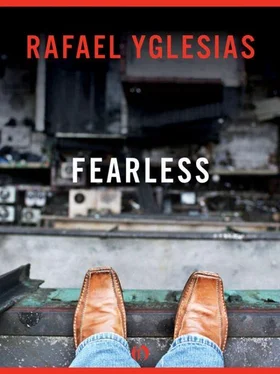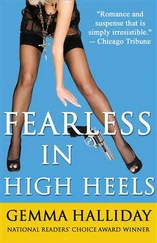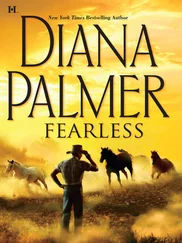These were dangerous ideas and he didn’t want to have them.
“No, I can’t face those reporters,” Max told the phone. “They’re asking me crazy stuff. I stand there saying I didn’t do it, I didn’t do it, like I’m a criminal.”
“It’s disgusting. I’ll call the police and they’ll get rid of them.”
Max laughed. Well, she was trying to help him, anyway, even if she wanted to turn the job over to others. That tilted his head back and he caught sight of the West Side Highway and beyond it, the edge of park on the river. He could get near to the water there. He thought he remembered there was a wall or a low fence or something that would bar him from actually touching it, but he could get very close. “I’ll call you later,” he said.
“Max!” her voice caught him from escaping.
“What? ”
“I want you to come home.”
“Not now.” This wasn’t a conversation with his wife; he was arguing with his widowed mom, expecting him to leave the stickball game early to relieve her loneliness.
“Fine. You don’t want to see me, that’s—” she made some sort of noise and then resumed with studied calm: “I want you to call Dr. Mayer.”
She referred to his shrink in so formal a way because she didn’t know him and they rarely discussed him. Bill Mayer was quite old now, semi-retired. Max was thirteen when his mother first made an appointment with the psychiatrist, concerned about the effect on Max of his father’s sudden death. Throughout his adolescence, whenever Max failed to be the A-student, the compassionate son, the loving brother, his mother would call Dr. Mayer. In fact, for several years Max’s therapy was largely consumed by discussions with Dr. Mayer about his mother’s use of it as a kind of punishment. Eventually Mayer went so far as to talk directly to his mother, suggesting that she leave it up to Max whether he continued therapy. Didn’t do a bit of good; one sulking look from Max and Mom would ask if she should schedule an extra session.
Debby had never invoked the good doctor, however. Threatening Max with mental health was a first for his wife.
“Fuck you,” Max said mildly and hung up. That was the end of that relationship. Who needs marriage anyway? Max decided. What was it but a way to personify life’s inadequacies?
He crossed Riverside Drive. Something honked at him. A jogger brushed past and cursed. The West Side Highway hummed with traffic. Burning meat blew down the avenue from some restaurant or vendor. He was going to the river no matter what.
“Hey — you got change, man?”
That was a teenager. A dark-skinned, sluggish, threatening teenager, with a slight Spanish accent. His hand was slung at his side, the palm up, but close to his hip and easily made into a fist.
“No,” Max said and kept on, going for the wall that separated Riverside Park from the highway.
“Where the fuck you going?” the teenager called after him.
Max hopped the wall, a car buzzed past, and he landed in the warm air of its wake. A white van in the middle lane honked and swung to the other lane nervously.
A blue Chevy was heading at Max now, slowing, but still on the move and honking at him.
The van passed in the center. Max stepped there. A yellow truck was next. It didn’t honk or slow. The driver kept coming.
Max let a black BMW go by and got out of the truck’s way, running to the divider just ahead of another black car. He got up on the low wall and perched, three lanes of northbound traffic behind, three lanes of southbound ahead. Some cars swerved into the other lane at the sight of him. There was confusion and worry in the movements of some drivers; others ignored him and sped inches from his position. He was nearly blown back onto the other road by the passing blast of air. One driver threw a cigarette at him and yelled: “Get the fuck off there, asshole!”
There was power in his legs, although they trembled on the divider. He could see details with magnified clarity. There were dried drops of black tar on the near lane, in a long dribble on the bleached concrete. There was a safety pin two lanes over, the top half smashed flat into the pavement. There was a fanned and blackened copy of TV Guide squashed at the far curb, inches from the small strip of grass between the highway and the Hudson, the mighty Hudson, a flowing gray mass slinking beside the bucking cars with a snake’s menace.
The traffic was dense southbound. He had to wait for a break; when it came he had only a few seconds to clear the road. A trio of cars was coming fast: a brown van in the slow lane, a taxi with its hood loose in the middle, and a baby-blue Mercedes in the far lane. Max jumped onto the road and ran across their bows. He knew if he stumbled he was dead. He knew the Mercedes in the far lane might be going too fast for him. He would soon reach the water or be killed.
He dived and rolled onto the patch of grass. He heard another curse from a passing car. He felt a breeze of gritty exhaust. A beer can crumpled under his right knee. He smelled the river. Max got up. The grass grew unevenly down to the low cement breaker. Masses of cigarette butts were lined against it as if they had died trying to make the ascent.
He looked across the water and was happy again. He had forgotten this freedom in his breathing, this strength in his legs, the openness in his head, welcoming the world without any unhappy thoughts to bar the way. He had forgotten this freedom since coming home last night; once again his sinuses were clear of the fear of death. He would dive in the Hudson and swim away from the city. Why not?
“Okay, man,” said the teenager from behind him. “How about now? You got change now?”
Max turned back toward the city. The skinny teenager had followed him across the highway. They were together on the narrow strip of grass, segregated by the road from Riverside Park. The hand was out, away from his body this time, again open to receive money, not begging, but demanding.
Max was disgusted. “Aren’t you going to tell me what you need it for?”
The hand retreated, moving to the pocket of his sagging dungarees. The teenager looked hot and unhealthy, dressed in long pants on a summer day, skinny ribs showing below a tight tank top. “What?” he said, squinting past Max.
Was there an accomplice behind him? Max wondered. Teenagers did their evil in groups: rape or mugging, they needed support from like spirits. Grown-ups killed alone. Max looked back. There was nothing but a lane of patchy grass curving with the river. Max turned to the kid. Sweat streaked down the teenager’s sideburns, flattening the kinky hairs. “I don’t have any,” Max said honestly. “I just came downstairs to—”
The hand came out of the pocket holding a long brown-handled knife, with no blade showing. There was a short silver metal cross at the end facing Max. The teenager angled his body so that the handle was hidden from the passing traffic. There was a sliding noise and a blade appeared, flashing into view. “Give me your fucking money or I’ll cut you bad,” he talked fast and flicked the blade at Max’s stomach, only a foot away. “Hurry up, man. I don’t want to fuck around. Just give me the fucking money.”
Max had left the apartment without his wallet or change. To call home he had had to use his phone credit card number. He wasn’t going to plead that, however. “Go ahead. Cut me. I don’t have any money to give you.”
“Come on,” the kid stepped closer and flicked the blade at Max. “Don’t fuck around.”
It was hopeless. The world was a hopeless and stupid place. Max felt the heat of its selfishness and looked away toward the Hudson. He would die in sight of it. That at least had dignity.
Max shook his head no at the mugger, his mouth in a regretful pout.
Читать дальше












